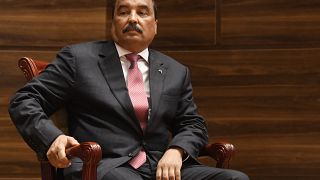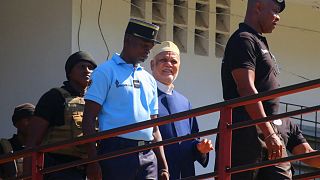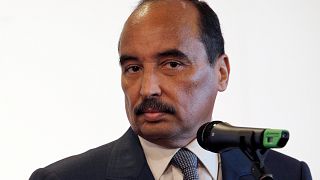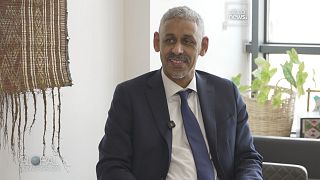Mauritania
The trial of former Mauritanian President Mohamed Ould Abdel Aziz opened Wednesday in Nouakchott, offering the exceptional image of a former head of state placed in a cage-like box to answer for illicit enrichment.
Tried for abusing his power to amass a huge fortune, the man who led from 2008 to 2019 this largely desert country of 4.5 million people twice the size of France stood up and waved when his name was called, then sat down behind the gates in the front row of 10 defendants present.
Former presidents, prime ministers, ministers and businessmen, they are charged with "illicit enrichment", "abuse of office", "influence peddling" or "money laundering" for an unknown period of time. Mr. Aziz, 66 years old, denies the facts and cries of a plot to remove him from politics.
In a white boubou, a surgical mask concealing part of his bald head and his thin moustache, Mr. Aziz has silently followed the president's interminable efforts to stop the confusion of the setting up and to find a space on the concrete benches for the hundred or so lawyers present in the immense modern courtroom with the air of a bunker plunged into the darkness.
These delays do not detract from the extraordinary nature of the moment, including beyond this pivotal country between the Maghreb and sub-Saharan Africa, which was once shaken by coups d'état and jihadist activities, but returned to stability under Mr. Aziz when trouble was brewing in the region.
"It is a first in the history of Mauritania and perhaps even in that of the Arab world that a former president explains his enrichment," Brahim Ebetty, one of several lawyers representing the state, told AFP.
Mr. Aziz is one of the few former heads of state to be held accountable for how he enriched himself while in power. His peers on trial in national or international courts are mostly on trial for blood crimes.
- Give the money back -
"All the people in the box have used the name of the state, the office of the state, especially Mr. Aziz" to enrich themselves, said President Ebetty.
Several Mauritanians interviewed by AFP hope that the trial will set an example in a country ranked 140th out of 180 by the anti-corruption organization Transparency International.
Perhaps unique, the moment may never be documented in pictures. The judiciary has banned all cameras in the room, including cell phones. They tediously filtered the entrances and outraged the lawyers by having them subjected to a search.
The authorities had hundreds of police officers surround the compound, with no clear indication of the threat to be averted, whether it was protests by Mr. Aziz's supporters or otherwise.
Dozens of people gathered outside the Palace before the trial, some to support Mr. Aziz, others to demand on placards that he "(return) the money.
The ability of Mr. Aziz, known to be pugnacious, calculating and unpredictable, to cause harm is a subject of speculation, even though he is often portrayed as politically isolated now.
He has been in constant denial since the screws began to tighten on him in 2019. That was a few months after he had given way after elections to one of his most loyal companions, his former chief of staff Mohamed Ould Cheikh El Ghazouani, the first transition not imposed by force in a country prone to coups since independence.
- Revisionism -
Aziz himself was brought to power by a putsch in 2008 and then elected president in 2009 and re-elected in 2014. This trial is the story of his disgrace and ruined friendship with the one he had designated as his successor, Mr. Ghazouani.
Mr. Aziz's daughter, Asma, described him to AFP as "tired." She said she was alerted Tuesday night by the former president's cardiologist because he had fallen ill after being detained. One of his lawyers, Me Antoine Vey, was alarmed by an "arbitrary" arrest and by conditions that augured that his client would not have a fair trial.
"The case has been built on a work that just looks like political revisionism," he told AFP. He was planning to ask for a postponement of the trial and was preparing to refer the case to UN bodies if this request was rejected. Mr. Aziz's successor has always denied interfering in the case.
None of the parties interviewed could say how long the trial would last.












01:01
Trial of DRC's former Justice Minister Constant Mutamba postponed for two weeks
01:11
Legal complaint targets family of DRC's Félix Tshisekedi for looting
01:52
Sean "Diddy" Combs will remain in jail until sentencing, bail denied
01:16
Sean 'Diddy' Combs found guilty on two counts, escapes prison for life
01:40
Kenya protests turn violent as court, activists demand justice for victims of police brutality
01:12
Judge dismisses juror in Sean 'Diddy' Combs trial